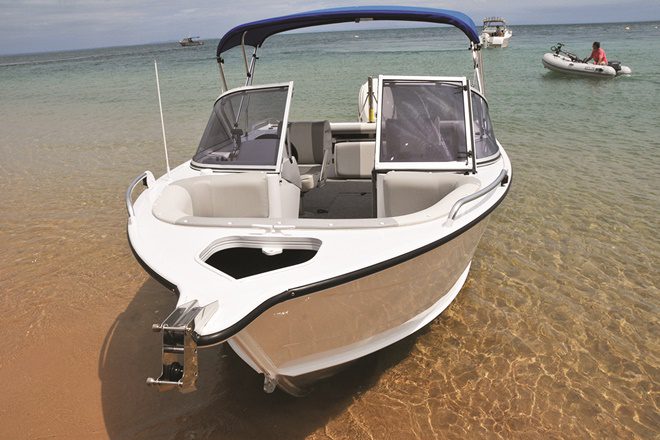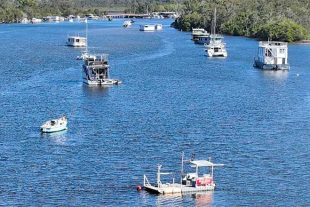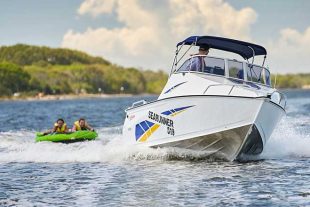COUNTLESS times, specialist marine insurers like Nautilus Marine have saved well-meaning boat buyers from making very, very expensive mistakes.
And it’s just another reason why it is always prudent to contact a marine insurer to get an estimate of how much it is going to cost to properly insure a particular boat before finalising the purchase. Even more so if it’s a used boat. Here’s why:
If you buy a used boat that subsequently turns out – even some years later – to have been stolen, then ordinarily you can kiss your original purchase price goodbye. Most times, your only chance to recover any money is to track down the person who sold you the boat and then set about proving in court that they knowingly sold you a stolen vessel. Having done that, you then have to secure a court order for recompense and after that, actually extract the money from the fraudulent seller. And just think about how difficult that’s all likely to be.
So where do marine specialist marine insurers come into this? Despite it not being their responsibility, marine insurers sometimes start seeing red flags when you begin giving them details like serial numbers, boat production numbers and registration details for the vessel you want to insure. As marine specialists, they sometimes know that a particular brand of boat ordinarily starts its vessel identification number with a certain series of letters or know where exactly in an outboard’s identification number the horsepower is indicated, or that it might be worth checking out why a boat being sold in Queensland has had a NSW replacement boat registration plate affixed to it.
They understand, unlike some potential owners, that a registration certificate is not proof of ownership, or that an assurance from the seller is not sufficient proof that the boat is not under some kind of financial encumbrance. It’s not the insurance company’s responsibility to confirm the seller’s legitimacy or the boat’s pedigree in terms of it not being stolen.
But sometimes, marine insurers are the first to smell something may be a little fishy or at least worth exploring further. As with all things relating to marine insurance and vessel ownership, it is always better for everyone to know all the details and circumstances before an event occurs, rather than learning afterwards. One of Queensland’s most respected boat brokers recently posted a very detailed explanation of how he set about checking details on a boat he had been asked to sell, simply because he was not comfortable with it having too many ‘replacement’ numbers for a relatively new boat.
Despite the ‘owner’ being totally unaware that his boat, bought as a used vessel some years before, had in fact been stolen earlier in its life, police seized the vessel with the intention of sending it back interstate. Unfortunately, in that case as with so many others, it was the person left holding illegitimate ‘ownership’ of the boat who suffered the financial loss. It is important to understand the key differences between insuring a stolen boat and having your legitimately owned boat, stolen.
If, even through no fault of your own, the boat you are trying to insure turns out to be stolen, then authorities will seek to return it to its rightful owner. You don’t get compensated unless you can achieve a successful outcome in a court action which you initiate. You are probably out of pocket thousands, even tens of thousands of dollars. However, if you are the legitimate owner of a properly insured boat and it gets stolen, then provided you have not breached the terms of your insurance contract, you will be paid out for the value – be that market value or agreed value – of the boat. In general terms, you are not out of pocket.
If the insurance company pays you out in accord with the theft provisions of your contract and then the boat subsequently turns up elsewhere, that boat ordinarily becomes the property of the insurance company, not you. “Why not?” you ask, “It was my boat”. Yes, that’s correct – it was your boat and you have been paid out for it by the insurance company.
You don’t get to ‘double-dip’, as in, you don’t get to keep the boat and the payout. If the insurer does recover the stolen boat for which it had provided cover, then it ordinarily has a legitimate right to sell that boat and recover back some or all of the money it paid out to you. Again, matters of ownership are not the responsibility of your marine specialist and they can’t be expected to be across the full history of every vessel.
But there sure are some very happy people out their whose wallets were saved by an eagle-eyed staff member at a specialist insurer like Nautilus. As always, any special conditions and excesses should always be explained clearly in your insurance policy’s product disclosure statement. Always check your PDS and if you have a query, ask for clarification.
If you need further information, you can contact Nautilus Marine Insurance on 1300 780 533 for any boat insurance requirements.
 Bush ‘n Beach Fishing Magazine Location reports & tips for fishing, boating, camping, kayaking, 4WDing in Queensland and Northern NSW
Bush ‘n Beach Fishing Magazine Location reports & tips for fishing, boating, camping, kayaking, 4WDing in Queensland and Northern NSW









